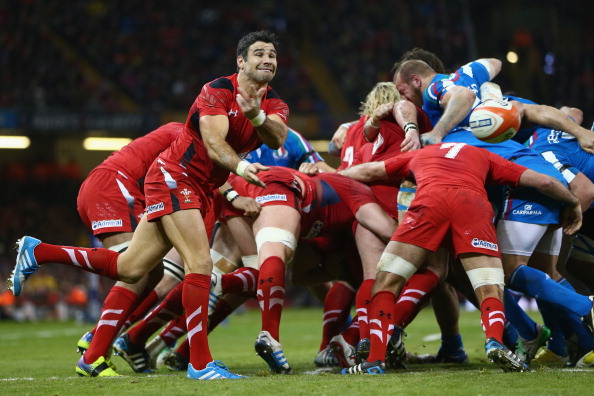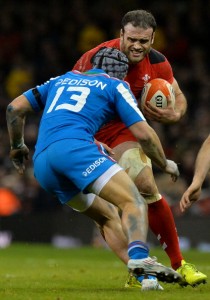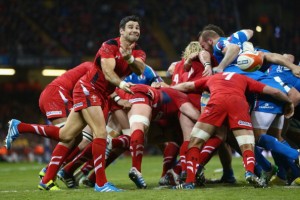
No walk in the park: Italy provided sterner opposition than many had predicted at the Millennium Stadium
By Paul Williams
Hard fought opener
Wales secured their opening win of the 2014 Six Nations with a 23-15 win over Italy. For Wales, this was an uncomfortably competitive fixture, with Italy deservedly gaining near parity in both territory and possession – Wales secured 54% in both. Whilst the score line and the possession stats may seem a touch below par there were some impressive individual performances. Richard Hibbard once again proved why he is arguably the best hooker in Europe, Jamie Roberts dominated the 12 channel and the Welsh systems allowed Dan Lydiate to focus on his defensive strengths – a luxury that he isn’t afforded in Paris.
It was also good to see Wales scoring a try from a set piece/ first-phase possession – as they did through Scott Williams‘ score in the 37th minute. Tries from lucky bounces and interceptions may get the crowd on their feet, but they are by their nature erratic and unpredictable and therefore not an accurate measure of a team’s progression. There will be some who will be disappointed with this performance and the scoreline, yet it is worth remembering that this Italian team finished above France and Ireland in last year’s championship. The true cost of this score line may not be truly known until the end of the tournament. ‘Points difference’ may have a big role to play come the final weekend.
Jamie Roberts is back
Only recently, French media voted Jamie Roberts one of the ten biggest flops in France. On Saturday he was the best player in Wales. Roberts was the team’s top ball carrier, he made 17 carries and dominated the gainline from first-phase possession. He was also the backlines’ top tackler making nine and missing none.
His upper body wrap tackles were particularly effective and seriously limited Italy’s ability to offload the ball in the central channels – the Italian centres didn’t make one offload between them. But Roberts didn’t just dominate the 12 channel. When he and Scott Williams switched channels, as they did for Scott William’s try, the extra-yard of space meant that was running at arms not shoulders. You won’t stop Roberts’ with an arm alone. Unless it’s the arm of an industrial crane.
Richard Hibbard impresses yet again
There was a time when Richard Hibbard’s career was blighted by question marks – particularly over his fitness. Against Italy, as with his performances of the last 12 months, Hibbard now has all the answers. He was bombastic against the Italians and is fast becoming Wales’ fourth backrow forward – as is demonstrated by his stats. Not only did he execute his core role well, Hibbard was also the packs’ second top ball carrier and tackler – he made ten tackles, missing none. But whilst Hibbard’s tackle stats are top drawer it was his array of tackles that was so impressive.
Hibbard has a reputation for big, head-on shoulder hits, but against Italy he executed some remarkable diving tackles using just his arms. The power of most players tackles are usually weakened when they use just an arm, and no shoulder – not Hibbard. He’s got arms like legs and even his ‘weak’ tackles make ball carriers look like they just ran over a landmine.
Welsh scrum weakened
The new post-engagement scrum protocols have definitely affected the Welsh scrummage – as we saw against Italy. This isn’t to say that the Welsh scrum was weak against Italy. It wasn’t. However, the Welsh scrum used to thrive on the ‘hit and chase’, where a weight advantage provided a significant benefit. This is no longer the case.
The Welsh front row had approximately a two and half stone advantage against Italy and the Welsh pack as a whole was approximately four and a half stone heavier overall. Yet the weight advantage counted for little. The Welsh scrum was by no means an issue of grave concern. But equally it is no longer the penalty generating machine that once gave Wales an extra three or four kickable penalties per game.
Hard to roll away
On Saturday numerous players were penalised for not rolling away. Some of the decisions were very harsh. Admittedly no one wants to see players deliberately slowing the ball down, however some of the situations that the players are expected to move away from seem very unfair. When you’re 18st 5lbs and 6ft 6in it’s difficult to get off a sofa with any degree of urgency. If you add in a 16st back row forward lying on top of you and the legs of a 19st prop draped over your chest – things become even more difficult. You are now talking about the sort of scenario that Houdini would struggle to get out off. A little bit of sympathy from referees for felled giants wouldn’t go amiss.








